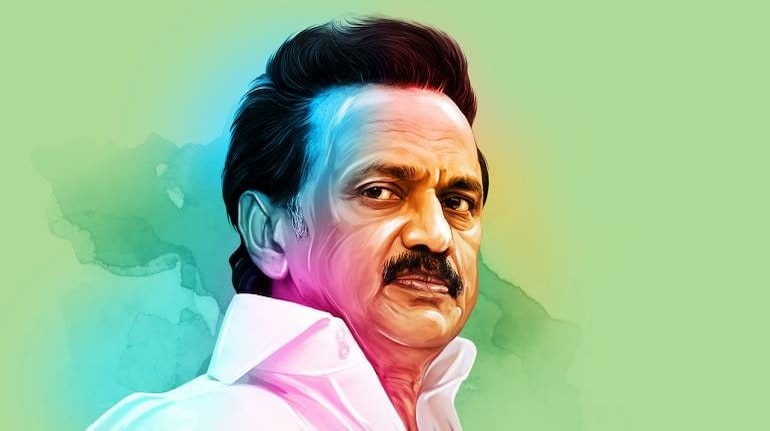



There was considerable excitement in Delhi during the recent visit of Tamil Nadu Chief Minister MK Stalin. The recent sojourn was planned around an event to inaugurate its new premises in the central part of the national capital, where most political parties will be situated.
Ahead of the function, Stalin had official engagements to push for issues of Tamil Nadu with the Centre. Yet, it was the April 2 show that caught the attention of political commentators who visualised the Dravida Munnetra Kazhagam (DMK) chief playing a catalyst role to rally parties opposed to the Bharatiya Janata Party (BJP).
Like a few other regional parties, the DMK and its leadership are raising concerns over its perception of dilution in federal character, constitutional structures, and autonomy of states. The party under Stalin is seeking to build opinion around these issues with parties including the Trinamool Congress (TMC), and those who share similar sentiments.
That the Congress interim president Sonia Gandhi chose to attend the party event as did leaders of the Left, and representatives of the Samajwadi Party, and the Telugu Desam Party, led to chatter in regard to a possible walk towards an alternative political front that can challenge the dominant presence of the BJP.
These are early days for any formation to take a concrete shape, and it is not yet clear how far is the DMK under Stalin willing to walk to rally political forces. In the past, regional political party leaders from Andhra Pradesh, NT Rama Rao and N Chandrababu Naidu, took the lead in creating what was euphemistically christened a Third Front in national politics. The front represented a stream pursuing policies distinct from those of the Indian National Congress, and the BJP.
During the early 1980s, the TDP founder and its first Chief Minister Rao straddled across the political spectrum to assemble a galaxy of regional leaders by organising ‘Opposition Conclaves” in states where these regional parties were in the government.
Those were the days when the Congress under Indira Gandhi returned to office after the historic defeat in 1977. The TDP emerged as the giant-killer as it emerged victorious by challenging the Congress in Andhra Pradesh. These conclaves in a way, paved the way for the formation of the National Front government of Vishwanath Pratap Singh, whose government took support both from the BJP and the Left. Later in the mid-1990s, Naidu as the convener of the steering committee took charge of the United Front government of HD Deve Gowda, and IK Gujral. The committee worked on policies and oversaw its implementation of its common minimum programme.
With the Congress and the BJP reworking strategy, and forging alliances, the Third Front experiments ended. Now with the advent of Narendra Modi at the Centre and return to single-party governance in most states, the Third Front is a chimera.
The DMK may find parties with goals of social justice, welfare measures, and restoration of federal balance in India as priorities, but the moot question is would Stalin assume leadership role?
Tamil Nadu and its leaders have in the past played key roles both in the Congress and in coming together of regional parties. For instance, K Kamaraj emerged as a strong leader from the state who had a strong presence in national politics and decades later GK Moopanar remained as a pillar of strength first for the Congress and later to the United Front government through the Tamil Maanila Congress.
As for the DMK, M Karunanidhi preferred to work in Tamil Nadu even though his party was integral to political arrangements at the Centre under the United Front, the BJP-led National Democratic Alliance (NDA) and Congress-led United Progressive Alliance (UPA).
Unlike other regional parties, be it the TMC, the NCP-Shiv Sena or the SP, the DMK’s primary challenge in the state comes from the All India Anna Dravida Munnetra Kazhagam (AIADMK), a party which is allied with the BJP. The other regional parties are pitted directly against the BJP, a situation accentuated by the steady erosion of the Congress which is conceding space at a consistent pace, in state after state. Similarly, the communist parties which remain the DMK’s steadfast allies too have lost a lot of ground with presence restricted in Kerala.
It is in this backdrop that Stalin’s outreach to AAP and its convenor Arvind Kejriwal offers a different perspective. After its stupendous victory in Punjab, AAP has raised its stakes in national politics, and is no longer an outlier. Yet, for all these parties with which the DMK leadership is willing to rub shoulders with, have positions that contradict one another.
There are multiple challenges before any emerging leadership of parties rallied against the BJP. First is to strive to arrive at a common meeting ground that takes it beyond the basic adhesive of opposition to the BJP; second, is to strike identical notes and synchronise policies with one another; third is to present a cogent alternative vision; and, finally, set a narrative to convince discerning voters to accept it on a national scale.
The road ahead is certainly long.
K V Prasad is a senior Delhi-based journalist.
Views are personal and do not represent the stand of this publication.
Discover the latest Business News, Sensex, and Nifty updates. Obtain Personal Finance insights, tax queries, and expert opinions on Moneycontrol or download the Moneycontrol App to stay updated!
Find the best of Al News in one place, specially curated for you every weekend.
Stay on top of the latest tech trends and biggest startup news.